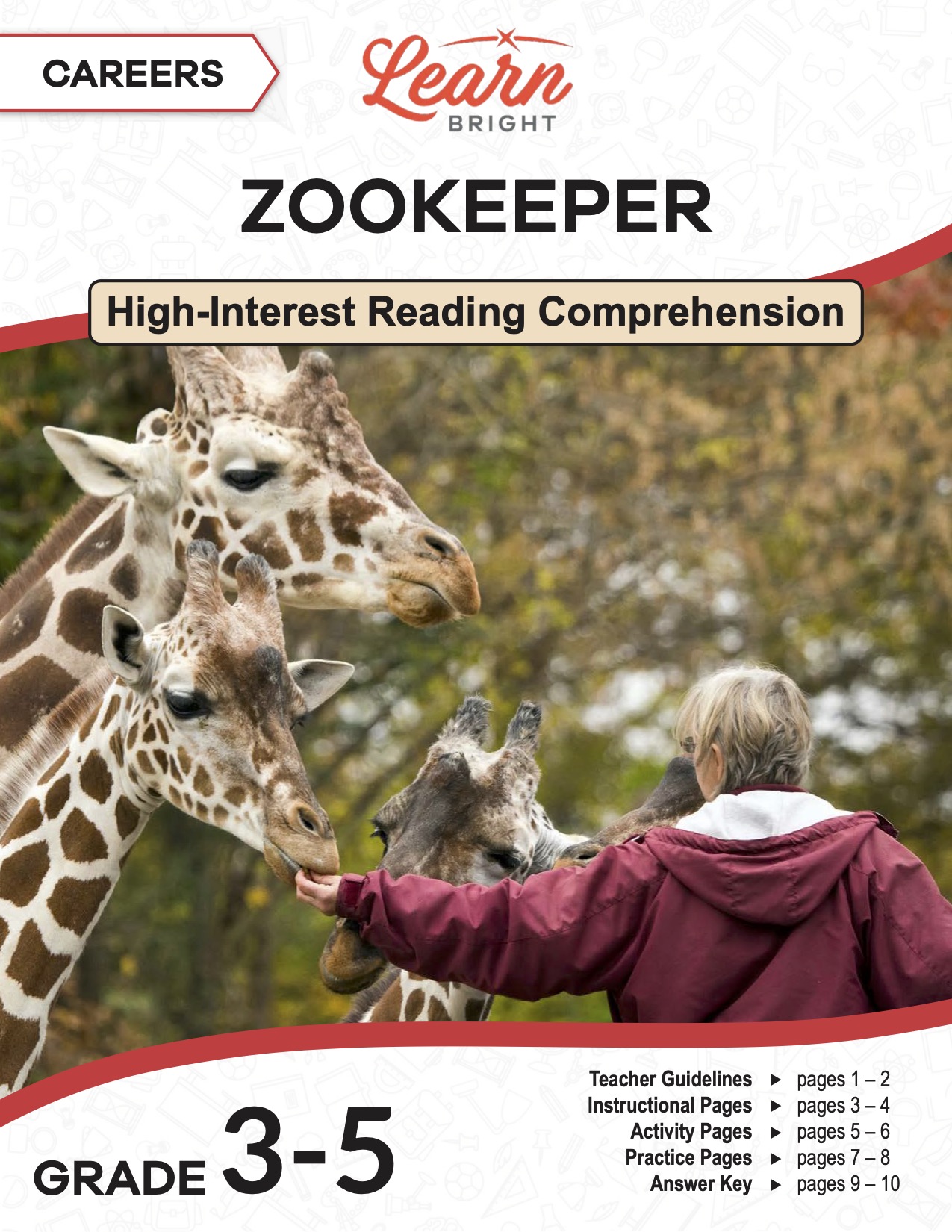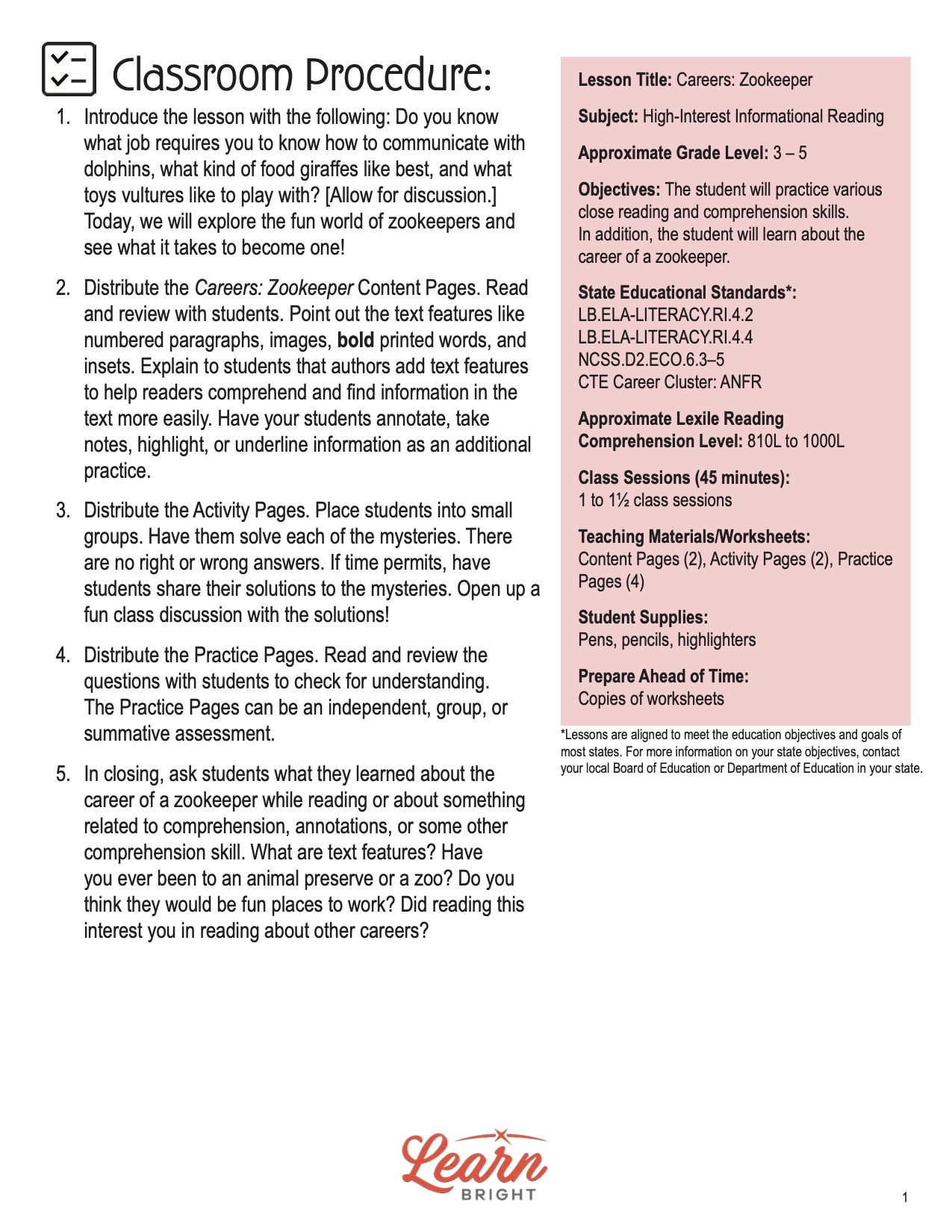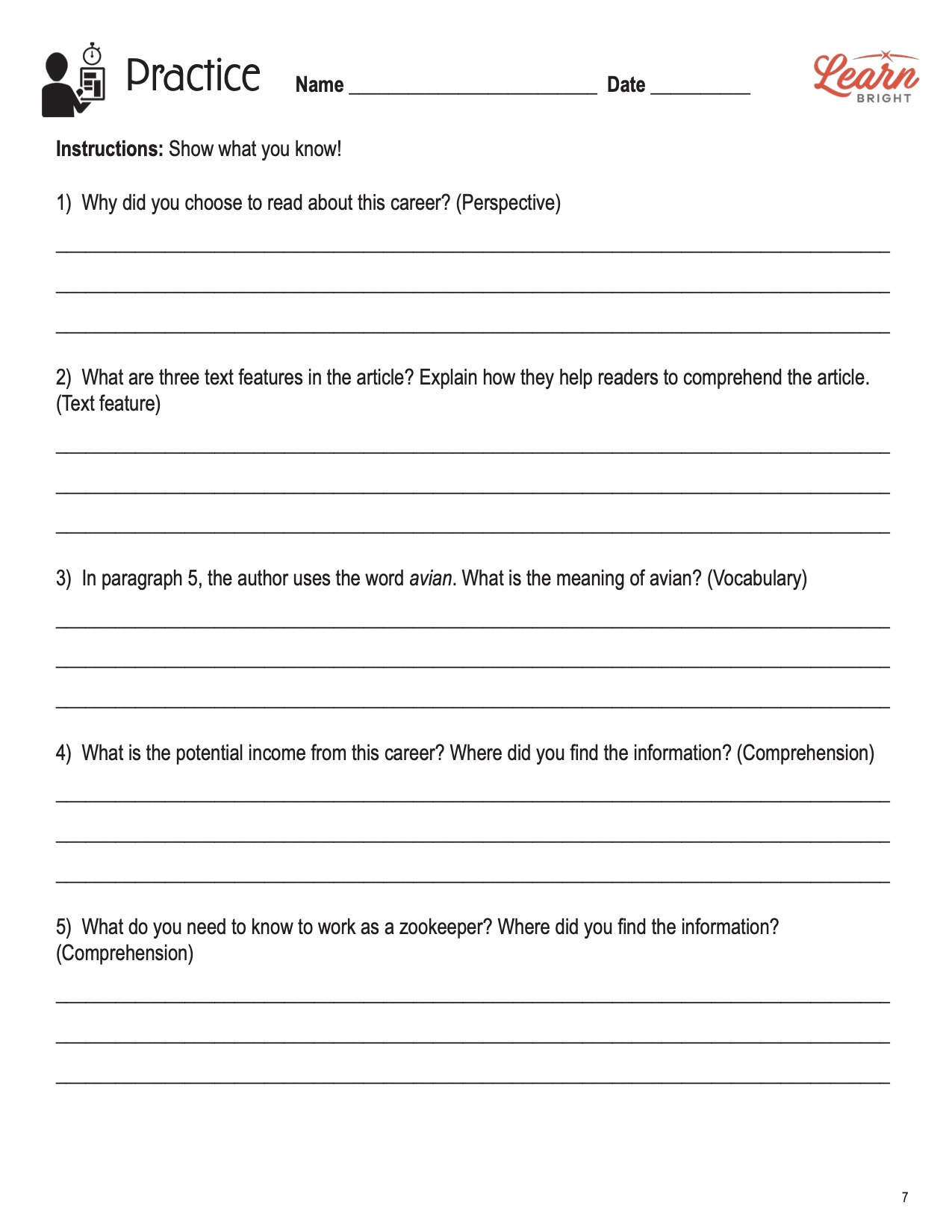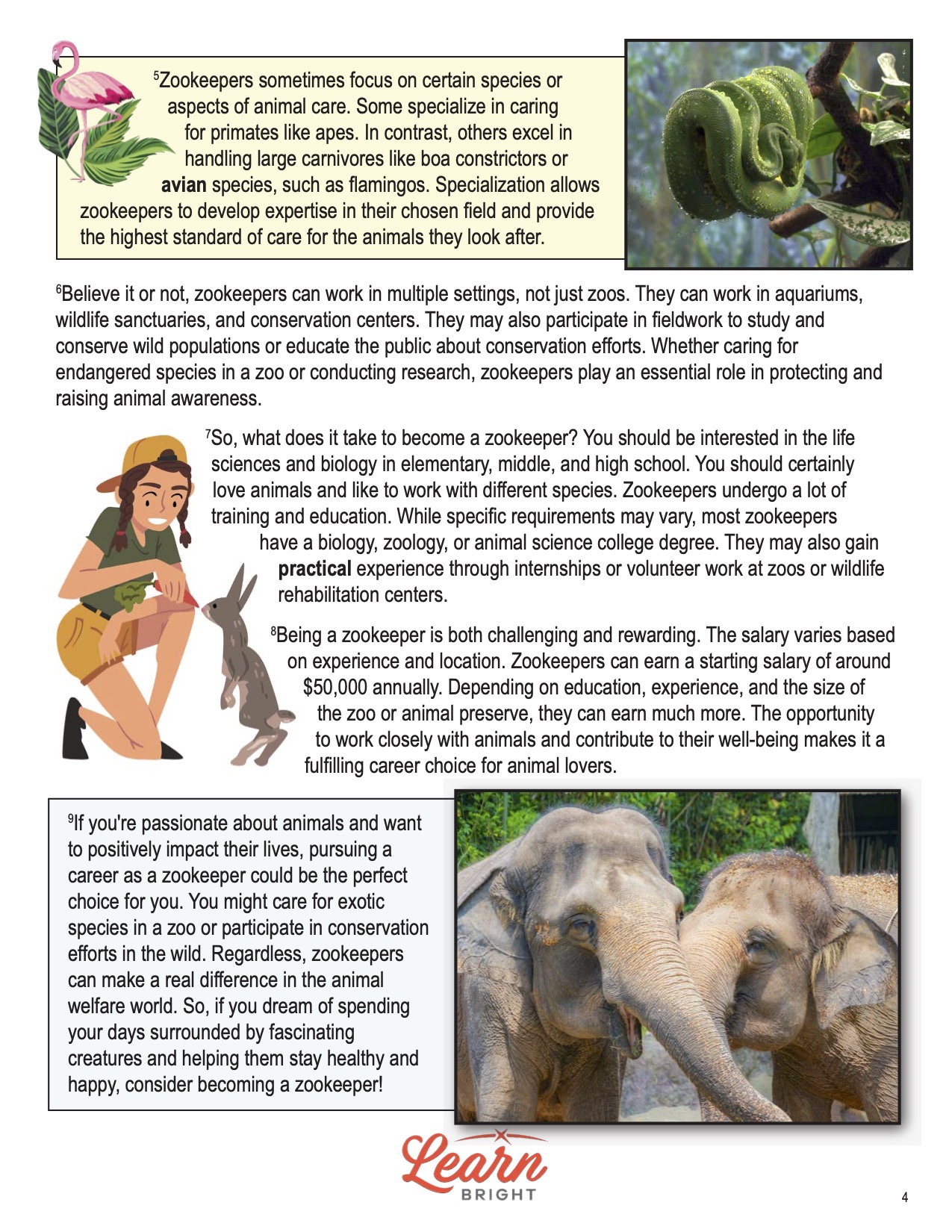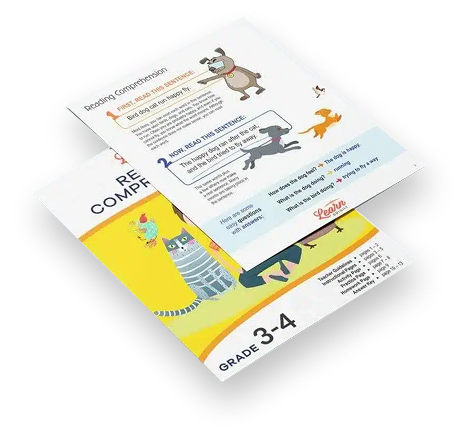Description
What our Careers: Zookeeper lesson plan includes
Lesson Objectives and Overview: Careers: Zookeeper is a high-interest reading comprehension lesson plan. As such, students will practice various close reading and comprehension skills. In addition, they will learn about the career of a zookeeper. This lesson is for students in 3rd grade, 4th grade, and 5th grade.
Classroom Procedure
Every lesson plan provides you with a classroom procedure page that outlines a step-by-step guide to follow. You do not have to follow the guide exactly. The guide helps you organize the lesson and details when to hand out worksheets. It also lists information in the yellow box that you might find useful. You will find the lesson objectives, state standards, and number of class sessions the lesson should take to complete in this area. In addition, it describes the supplies you will need as well as what and how you need to prepare beforehand.
Teacher Notes
The paragraph on this page gives you a little more information on the lesson overall and describes what you may want to focus your teaching on. It explains that you can teach this lesson in a whole-class setting or as an independent, small-group activity. The blank lines are available for you to write out any thoughts or ideas you have as you prepare.
CAREERS: ZOOKEEPER LESSON PLAN CONTENT PAGES
Life as a Zookeeper
The Careers: Zookeeper lesson plan contains two content pages. Have you ever been to a zoo or an animal park? Did you ever wonder who might be taking care of the animals you see? Maybe you thought about how cool of a job that would be—working to keep animals healthy and safe! It’s important to consider what you might want to do once you grow up. Zookeepers are the caretakers of the animal residents in zoos. They play a big role in caring for all the creatures in the zoo, from the smallest reptiles to the largest mammals.
A zookeeper’s day is filled with a wide variety of tasks. They interact with animals of all shapes and sizes, from feeding and grooming them to providing fun learning activities that stimulate their natural behaviors. Each day brings new challenges and rewards as zookeepers engage in activities to promote the physical and mental health of the animals under their care. Time flies when you work as a zookeeper!
Zookeepers carefully prepare and deliver a balanced diet that they tailor to each species’ needs. They want to make sure the animals get the proper nutrients for their health. They also perform regular health check-ups, administer vaccinations, monitor behavior, and treat injuries or illnesses. Additionally, zookeepers design and maintain enriching habitats that mimic the animals’ natural environments.
Helping the Animals
The animals in a zoo must have fun and stay healthy. Zookeepers make this happen by creating exciting places to live. They add tall trees for monkeys to climb, big ponds for ducks to swim in, and different kinds of grounds for animals to explore. They also give animals special toys and puzzles to play with that make them think. Sometimes, they even change things around to keep the animals interested and happy. This helps the animals stay active and feel like they’re in their natural home.
Zookeepers sometimes focus on certain species or aspects of animal care. Some specialize in caring for primates like apes. In contrast, others excel in handling large carnivores like boa constrictors or avian species, such as flamingos. Specialization allows zookeepers to develop expertise in their chosen field and provide the highest standard of care for the animals they look after.
Believe it or not, zookeepers can work in multiple settings, not just zoos. They can work in aquariums, wildlife sanctuaries, and conservation centers. They may also participate in fieldwork to study and conserve wild populations or educate the public about conservation efforts. Whether caring for endangered species in a zoo or conducting research, zookeepers play an essential role in protecting and raising animal awareness.
Logistics of the Career
So, what does it take to become a zookeeper? You should be interested in the life sciences and biology in elementary, middle, and high school. You should certainly love animals and like to work with different species. Zookeepers undergo a lot of training and education. While specific requirements may vary, most zookeepers have a biology, zoology, or animal science college degree. They may also gain practical experience through internships or volunteer work at zoos or wildlife rehabilitation centers.
Being a zookeeper is both challenging and rewarding. The salary varies based on experience and location. Zookeepers can earn a starting salary of around $50,000 annually. Depending on education, experience, and the size of the zoo or animal preserve, they can earn much more. The opportunity to work closely with animals and contribute to their well-being makes it a fulfilling career choice for animal lovers.
Zookeepers sometimes focus on certain species or aspects of animal care. Some specialize in caring for primates like apes. In contrast, others excel in handling large carnivores like boa constrictors or avian species, such as flamingos. Specialization allows zookeepers to develop expertise in their chosen field and provide the highest standard of care for the animals they look after.
If you’re passionate about animals and want to positively impact their lives, pursuing a career as a zookeeper could be the perfect choice for you. You might care for exotic species in a zoo or participate in conservation efforts in the wild. Regardless, zookeepers can make a real difference in the animal welfare world. So, if you dream of spending your days surrounded by fascinating creatures and helping them stay healthy and happy, consider becoming a zookeeper!
CAREERS: ZOOKEEPER LESSON PLAN WORKSHEETS
The Careers: Zookeeper lesson plan includes two worksheets: an activity worksheet and a practice worksheet. Each one will help students solidify their grasp of the material they learned throughout the lesson. You can refer to the classroom procedure guidelines to know when to hand out each worksheet.
MYSTERY AT THE ZOO ACTIVITY WORKSHEET
For this activity, students will read through three mystery scenarios that take place at a zoo. With a partner or group, students will use the clues in the right column to figure out what might have happened. There are no wrong answers! Students can use their imaginations to piece together what happened in all three scenarios. They can also create their own mysteries and clues for other students to solve.
REVIEW PRACTICE WORKSHEET
The practice worksheet lists 10 questions based on the content. These questions all relate to the content pages, so students will need to refer to them often for the answers. In addition, each question provides which reading tool the question corresponds to, such as text feature, vocabulary, or comprehension.
Worksheet Answer Keys
At the end of the lesson plan document is an answer key for the practice worksheet. The correct answers are all in red to make it easier for you to compare them with students’ responses. If you choose to administer the lesson pages to your students via PDF, you will need to save a new file that omits these pages. Otherwise, you can simply print out the applicable pages and keep these as reference for yourself when grading assignments.

